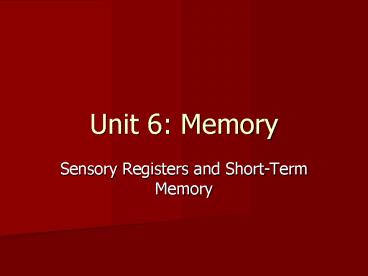Unit 6: Memory PowerPoint PPT Presentation
1 / 18
Title: Unit 6: Memory
1
Unit 6 Memory
- Sensory Registers and Short-Term Memory
2
Objectives
- Define sensory register, attention, and
short-term memory - Participate in short-term memory activities
- Experience ways to improve short-term memory
3
Sensory Registers
- Sensory Registers entry points for raw sensory
information (think of a waiting room where
information sits for a very short amount of time) - They have unlimited capacity for information
- Not able to retain all that information
4
Sperling Experiment
- Three rows of letters (12 per row) flashed to
participants - Tone signaled which row to recall
- Results
- Sounding tone immediately led to recall of 3-4
letters - Sounding tone after 1 second led to recall of
only 1-2 letters - Visual registers retain information for less than
a second
5
Masking
- Masking new information replaces old immediately
in the sensory register - Visual information is erased in a quarter of a
second - Auditory information is erased after several
seconds due to the fact that sound echos
6
Attention
- Attention is the process of selectively looking,
listening, smelling, tasting, and feeling - We remember information that we pay attention to,
otherwise all information would be lost once
sensory receptors were erased
7
Attending to the World
- Cocktail-Party Phenomenon is when you filter out
all other conversations around you - Although not attending to other conversations,
you are processing it at a lower level - If someone says your name in a different
conversation, your attention switches over to
that conversation over the one you were in
8
Attending to the World
- Automatic processing can sometimes fail if you
are focused on one thing, you might miss
something important - Basketball game with gorilla
- Watching TV and dont hear your mom yelling at you
9
Short-Term Memory
- Short-Term Memory holds information we are
thinking about or are aware of at any given
moment. It is known as working memory and only
briefly stores and processes information from
sensory registers. - When studying, you need an isolated, quiet
environment because your STM can only handle a
limited amount of information - STM can hold as much information that can be
repeated in 1.5 to 2 seconds
10
STM Example 1
- C X W
- M N K T Y
- R P J H B Z S
- G B M P V Q F J D
- E G Q W J P B R H K A
11
STM Example 2
- TJYFAVMCFKIB
- How many can you remember?
12
STM Example 3
- TV FBI JFK YMCA
- How many can you remember?
13
Example 4
- Half the class close eyes and count backwards
from 100 silently - Other section reads following list, then closes
eyes and counts backwards from 100 silently - Switch roles
14
STM Example 4
- snake
- violin
- target
- terrace
- skin
- arrow
- book
- football
- worm
- nude
- goal
- bow
15
STM Example 4
- book
- worm
- snake
- skin
- nude
- violin
- bow
- arrow
- target
- goal
- football
- terrace
16
Chunking
- Chunking is a way of grouping and organizing
information so that it fits into meaningful units - Remember these numbers in order
- 106619451812
- Now remember them
- 1066 1945 1812
17
Limitations of STM
- When pairing two types of tasks using the same
sensory register it is difficult - Counting backwards from 100 while memorizing list
of letters - Easier when pairing two different sensory
registers - Listening to music while studying
18
Storing Information in STM
- Phonologically according to how it sounds
- Visual form
- Maps, diagrams, paintings
- Based on meaning
- Rote rehearsal repeating information over and
over to commit to memory

